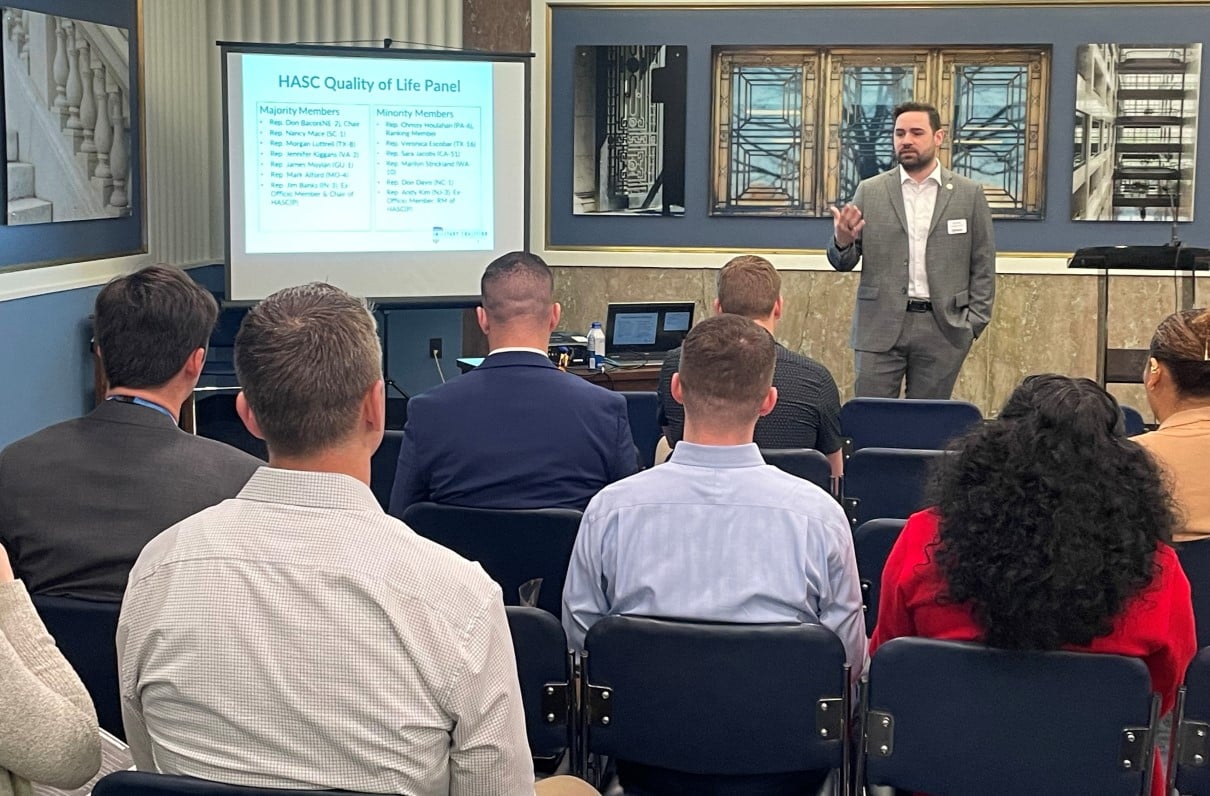By MOAA Staff
MOAA joined fellow members of The Military Coalition on May 30 to ensure congressional staffers understand the importance of quality-of-life reforms to the health of the all-volunteer force – a critical discussion as the must-pass National Defense Authorization Act (NDAA) moves forward.
“The House just finished their markup of the NDAA, so now we need to make sure the Senate includes many of the provisions as well,” said Cory Titus, MOAA’s director of Government Relations for Servicemember Compensation and Veteran Benefits, who led the briefing, held in the Dirksen Senate Office Building. “We worked really hard to make sure MOAA’s opinions and views were included on the House side.”
[RELATED: 8 Ways the House NDAA Would Help Military Families With Child Care Needs]
More than 30 associations representing about 5.5 million people make up The Military Coalition; MOAA has been part of the group since its 1985 founding. MOAA and other coalition members have been active partners with the House Armed Services Committee’s Quality of Life Panel, whose April report included a series of recommendations to improve conditions for currently serving members and their families.
Many of those recommendations became the heart of H.R. 8070, the Servicemember Quality of Life Improvement Act, which served as the foundation for this year’s NDAA. A full breakdown of NDAA provisions of interest to MOAA members can be found here, but among the highlights: A restructured pay table to reward junior servicemembers and combat the recruiting crisis; expansion to TRICARE coverage with a focus on family care; improvements to DoD child care offerings; and the restoration (albeit for only one year) of the Basic Allowance for Housing (BAH) to 100%.
Restoring full BAH has been a priority for MOAA this year and was a focus of our Advocacy in Action campaign in the spring. Presently, servicemembers only receive 95% of their DoD-estimated housing costs, covering the other 5% themselves.
[TAKE ACTION: Ask Your Lawmakers to Support Full BAH Restoration]
“Most servicemembers frankly aren’t aware of this, but they’re getting short-changed,” Titus told the staffers regarding the BAH provision.
MOAA remains committed to full restoration of the allowance moving forward, but the NDAA language solidifying FY 2025 funding represents significant progress and will circumvent Congressional Budget Office requirements that would’ve required a funding offset in another part of the budget.
Making Your Voice Heard
These outreach events allow MOAA to influence those in the halls of power, and while staffers were receptive to the message, lawmakers’ offices are even more receptive to constituent requests. That’s where you come in.
MOAA’s Legislative Action Center allows members and others to remain engaged with their lawmakers throughout the NDAA process, ensuring key provisions remain in the legislation throughout conference committees, amendments, and late-night legislative sessions. By reminding your lawmakers that their constituents haven’t forgotten about these priorities, you can help ensure these critical quality-of-life improvements aren’t overlooked.
Visit MOAA.org/Advocacy-News for ongoing updates on the NDAA process and MOAA’s other legislative priorities.
When MOAA Speaks, Congress Listens
Learn more about MOAA’s key advocacy issues, and contact your elected officials using our messaging platform.
